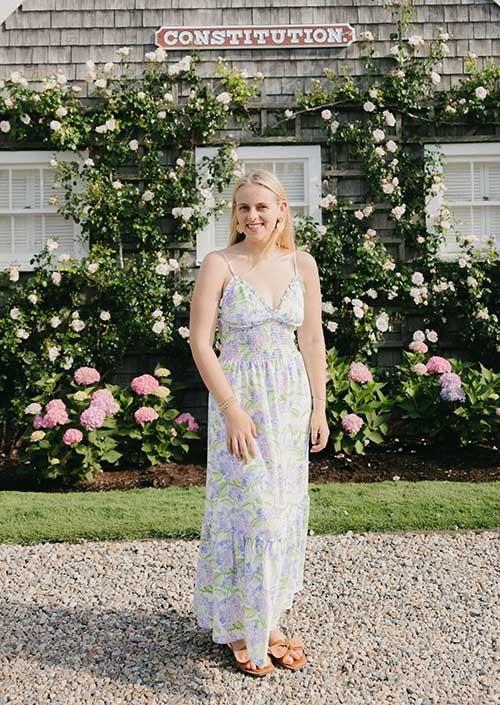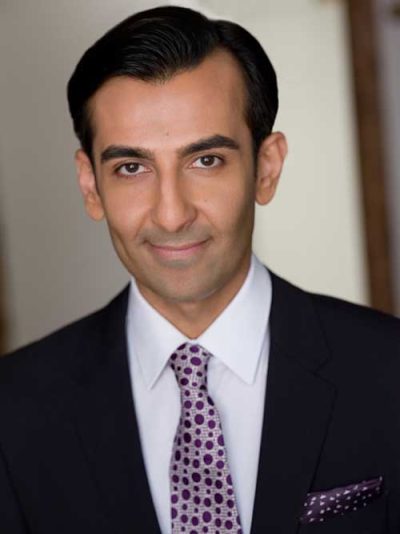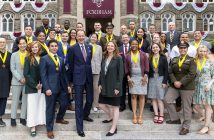Since 2012, the Fordham Foundry has supported scores of students, alumni, faculty, and community members along their journeys as entrepreneurs, from hosting pitch competitions with cash prizes, like the Ram’s Den and Pitch Competition, to having an open-door policy and fostering a collaborative environment that encourages students to put their big dreams and critical thinking to the test.
Directed by serial entrepreneur and executive director Al Bartosic, GABELLI ’84, the Foundry also oversees the Fordham Angel Fund, which offers investments of up to $25,000 to the University’s active student and alumni founders.
Fordham Magazine caught up with a handful of alumni who received funding, coaching, or other support from the Foundry to find out where they—and their businesses—are now, and how they got there.
Mary Goode, FCRH ’20
Founder and CEO, Nantucket Magic
Fordham Degree: B.A. in Economics
The launch: I grew up on Nantucket Island and watched the tourist landscape change dramatically over the years, becoming increasingly popular yet harder to navigate. The company uses local expertise to offer hotel-like concierge service and amenities to vacationers in Nantucket, Massachusetts, and Palm Beach, Florida, including pre-arrival fridge stocking, dinner reservations, private chefs, backyard movie nights, beach picnics, wellness experiences, and more.
The challenge: Our biggest challenge has been navigating how to scale the business while maintaining exceptional service. To surmount this, we have recruited hospitality experts to work seasonally in both locations.
The assist: The Foundry has played a huge role in the success of my business! I learned so much during the process of the pitch competition alone. The actual funds I won helped us pay for marketing campaigns as well as expand our team, among other things.
The goal: I have been trying to broaden the definition of what success means to me. No matter what happens in the future, what I have created so far feels like an immense personal success, chiefly because of the incredible people I have worked with over the past three years.
Marquice Pullen, GSE ’21
Co-Founder, DAB Pickleball
Fordham Degree: M.S.E., Curriculum and Teaching
The concept: DAB Pickleball is a one-stop shop for pickleball players worldwide. Comprehensive infrastructure, certified coaching tips, quality equipment, competitive prices. Events, tournaments, and a thriving community. Your ultimate pickleball resource. I can’t take credit for the idea. My business partner and brother, Antonio, stumbled upon the sport at Acworth Community Center in Georgia.
The process: We participated in three pitch challenges: Fordham Foundry Rams Den, Fordham vs. Bronx, and Black Ambition, all within one year, and were successful in all three, thanks be to God. Social media marketing, risk management, inventory management, tax filing, bookkeeping, and opening our first facility in July 2023 were all challenging aspects of the process. However, we found our momentum in late December 2023.
The foundation: Initially unfamiliar with Fordham University, my enrollment through the Army Civilian Schooling (ACS) program, driven by my aspiration to become an instructor at the United States Military Academy, inadvertently initiated our entrepreneurial journey. Rooted in Jesuit principles, my education at Fordham eventually led me to the Fordham Foundry. Without Fordham University as a catalyst, I might not have discovered the Foundry or ventured into entrepreneurship.
The win: Success is evident through our community of players and dedicated volunteers and supporters. Seeing the smiles on our consumers’ faces as they enjoy the game of pickleball and, more importantly, witnessing the competitive spirit of our elderly pickleball players, is a success story in itself.
Rachel Ceruti, GSAS ’20
Founder and CEO, Reclypt
Fordham Degree: M.A. in International Political Economy and Development
The vision: I kind of fell into the sustainable fashion scene in New York City and upcycling—when you or designers take something that was going to be thrown away and repurpose it, diverting textiles from landfills. I started a blog that transitioned into a marketplace for fashion, but our community told us they wanted to do the upcycling, not just buy it. We listened, and our mission is to use our platform to explore circular economy structures, with Reclypt as a hub that explores how we create change.
The challenges: Funding really comes to mind. You can’t rely on unfair wages and volunteers. Another challenge, too, is letting people know why circular fashion is needed and what it is.
The assist: I would go into the Foundry space and pop ideas off of the other entrepreneurs and the Foundry team. I benefited from the free office hours with a lawyer. The business aspects that are behind the scenes, I would have never been able to navigate without the Foundry.
The next step: We want to host consistent events; be able to grow and hire, including start monetizing my team’s time; gain more visibility; and establish a steady revenue stream.
Usman “Ozzy” Raza, PCS ’14, GABELLI ’21
Founder and CEO, Equepay
Fordham Degrees: B.A. in Economics, Executive M.B.A.
The concept: Equepay is at the forefront of simplifying billing and payment processing, not just in health care but extending our innovative solutions beyond. We aim to convert the complex financial operations in hospitals and clinics into streamlined, user-friendly processes, ensuring easy and efficient financial management for all involved.
The launch: Equepay was born out of discussions with friends in the health care sector who highlighted ongoing challenges with payment processing and collections. Recognizing the untapped potential in this underserved market, I founded Equepay. Since launch, Equepay has been expanding its solutions across various hospitals in the U.S.
The foundation: My EMBA from Fordham has been crucial in shaping my entrepreneurial journey. The knowledge and skills acquired laid a solid foundation for Equepay’s strategies and operational methodologies.
The goal: Success is an evolving target. Our immediate goal is to integrate our platform into 196 hospitals by the end of the year, continuously enhancing our services to meet the growing needs of the healthcare sector.
Emmit Flynn, FCRH ’21
Co-Founder, Awful Cloth
Fordham Degree: B.A. in English
The brand: We started Awful Cloth to be an online apparel company for street and lounge wear, with a lot of colorful designs and bright, vibrant ideas. All of them were hand-drawn original designs with me as the designer.
The launch: For eight or 10 months, it was all planning. We got all the domains, Twitter, and Instagram very early on before we had anything produced. That made all the difference when we finally did start to get traction. Then it was a lot of workshopping and pushing it out to our friends and family to see what the response was.
The hurdles: The true hurdles were things that are intangibles. It wasn’t “where do we find this factory” or “how do we do this.” Those things were small hurdles, but we were so driven that there was nothing like that that would stop us. It was more about the mental hurdles: having patience and confidence and being sure of ourselves. Especially early on when things were slow, and we weren’t making any sales, and we weren’t making any profit.
The win: We recently sold the business to a company called Lilac Blond. We were very happy to do it because selling was a goal of ours and we knew these people—and we were sure that they wanted the best for the brand.








